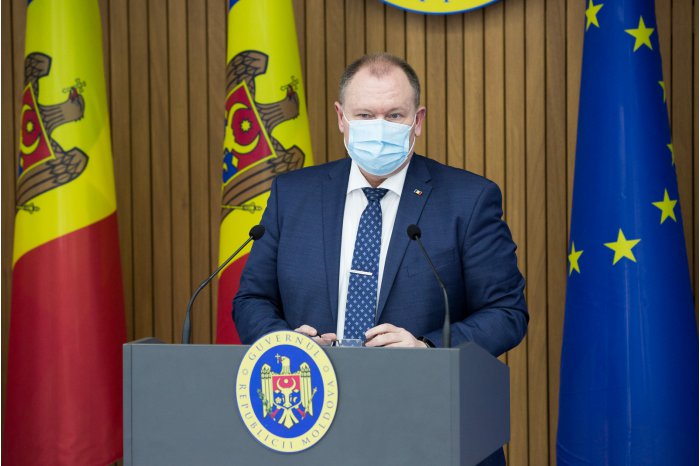Moldovan acting PM says time is ripe for everybody to jointly assume responsibilities
18:51 | 19.03.2021 Category: Official
Chisinau, 19 March /MOLDPRES/ - The National Extraordinary Public Health Commission (CNESP) today held a meeting to consider the actions needed to be established, in order to diminish the risk of spread of the Sars-Cov-2 virus in Moldova, the government’s communication and protocol department has reported.
According to the National Public Health Agency (ANSP), presently about all districts of Moldova are under the Red Code, established when 100 infections are recorded per 100,000 residents. The most serious situation is registered in Chisinau, followed by the districts of Anenii Noi, Ialoveni, Straseni, Briceni.
Thus, CNESP declares emergency state in the public health sector all over Moldova on the period 19 March – 18 April inclusively. A string of restrictive measures will be in force on this period.
CNESP ruled to change the regime of work of the commercial centres and non-food trade centres, which will work till 18:00 as of 20 March. At the same time, the agro-food markets and non-food ones will act starting from 7:00 till 15:00. ‘’This will allow relieving the flow of people in the evening hours, not only in the Chisinau municipality, but also all over the country. Moreover, the difference in their work will allow easing the number of people in the public transport,’’ Prime Minister Aureliu Ciocoi said at a news briefing held following the CNESP meeting.
The restaurants and public nourishment pubs will be able to receive visitors only till 20:00. After 20:00, the pubs will be able to work only with the supply of products at home. Also, CNESP bans the holding of weddings, christening parties, anniversaries and other events in public nourishment units. The Commission also prohibits the organization of scientific meetings, Olympiads or sports competitions with physical presence of people. The holding of festivals, specialize exhibitions, agricultural fairs and commercial events will not be allowed too.
The civil servants will further act according to a special working regime; only the strictly needed staff will be attracted to work, in order to ensure the institution’s functionality, while the distance work will be instructed for the other employees. CNESP urges the private institutions to organize their work in line with this principle.
Starting from 23 March, the people from abroad entering Moldova will be obliged to present the negative test for COVID-19, made in the last 72 hours. The Moldovan citizens who do not have the test made while entering the country will be obliged to fill in the epidemiological cards, put down the contact data and the address, so that the control services can verify the observance of the regime of self-isolation for 14 days. The quarantine could be interrupted on the tenth day, after the carrying out of the COVID test, which is to show a negative result. The CNESP decision sees a category of people who represent exception from this provision.
In Moldova, the education process will be organized in accordance with the epidemiological indexes from the settlement. Thus, the local public authorities (APL) of the first and second levels, jointly with the administrations of schools and kindergartens, will decide, separately, on the ceasing of the education process or if there are conditions for continue the studies with physical presence. ’Nevertheless, there are settlements where the epidemiological situation is not so serious. Therefore, the ceasing of the education process, including for the elementary school or the continuation of the education, will remain at the discretion of the local authorities, education institutions of early education institutions,’’ the acting PM said.
On this period, the control structures will be massively involved, including in the week-end, for monitoring and verifying the degree of observance of the restrictions approved. ‘’One thing is the restriction on paper and what we really see on the street is something else,’’ Ciocoi stressed.
Also, CNESP urges the academic and scientific environment of Moldova to fully get involved in the process of communication and explaining the danger of the pandemic, as well as the actions necessary. ‘’I urge the entire academic environment from Moldova to be proactive in this respect. You know how harmful the fake news is, both as to the vaccines and on the possible negative effects of the latter. We have no other chance of overcoming the pandemic but the through spread of the sanitary restrictions, but especially by the general vaccination of the population,’’ Aureliu Ciocoi said.
In the context, the acting PM stressed that, due to the development partners, 24,570 doses of Pfizer vaccine would be delivered to Moldova through the COVAX mechanism before term. On 22 March, another 21,600 doses of AstraZeneca vaccine are to be brought to Moldova and on 22 April, Moldova will receive a consignment of 72,000 doses of AstraZeneca vaccine. At the same time, the authorities are expecting another consignment of vaccines provided by Romania.
In the end of the news briefing, the acting PM made a call to the political establishment: ‘Given that this government is an acting one, with limited powers, it would be a good thing if a special parliament meeting is held, with the participation of the acting cabinet, as well as of the country’s president, so that, by common consent, we agreed on the immediately next measures imposed by the present epidemiological situation. Time is ripe for every power branch from Moldova, everybody jointly assume responsibilities.’’
photo: Government

